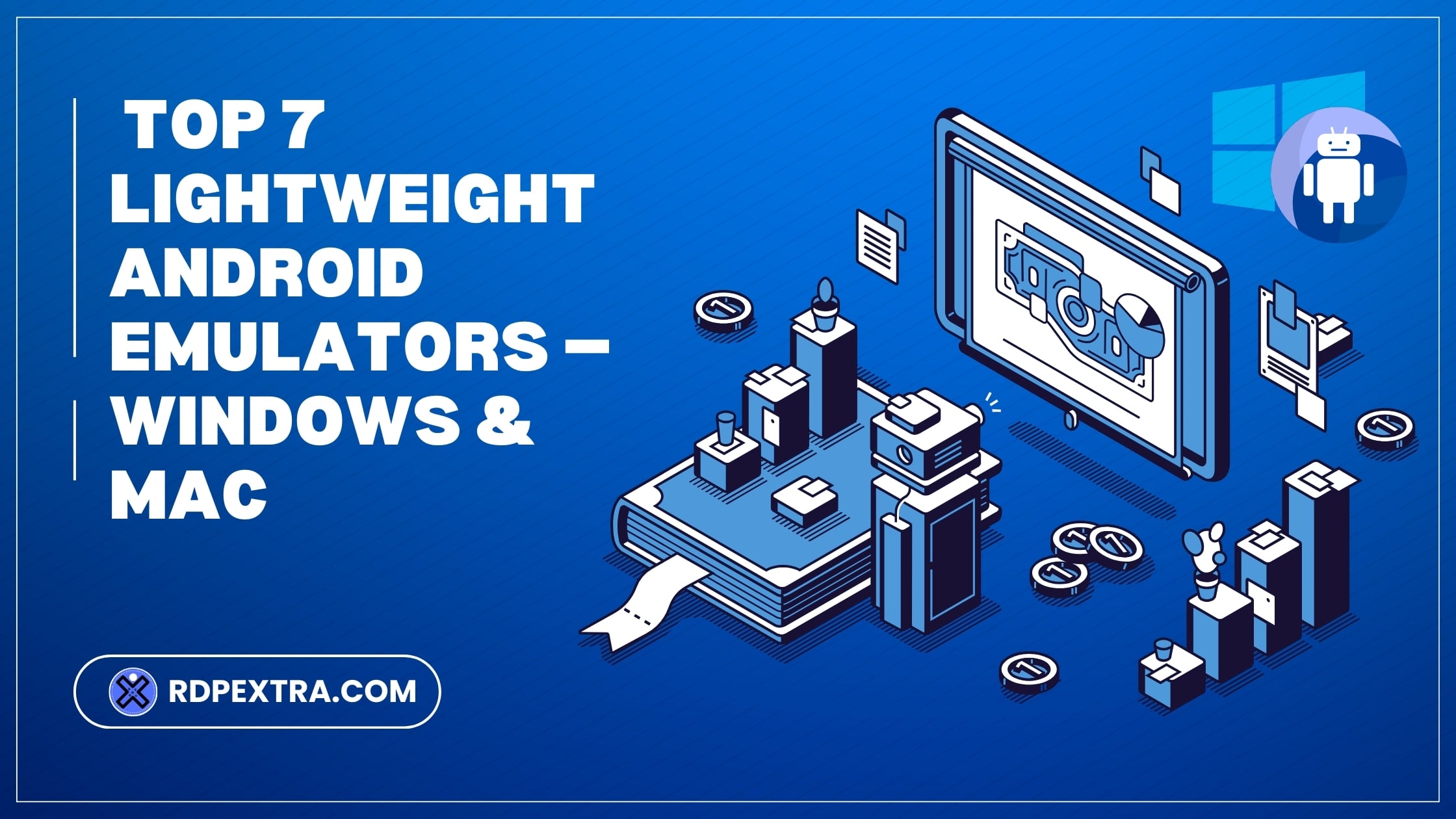
7 Best Android Emulators Reviewed in 2025
If you’re searching for the best Android emulator in 2025, you’ve landed in the right place. lightweight Android emulators have become indispensable for gamers, developers, and productivity enthusiasts. Whether you want to play high-FPS mobile games on PC, test apps across multiple Android versions, or simulate real-world device conditions, a reliable emulator saves both time and resources.
I’ve tested countless Android emulator for performance, stability, features, and pricing. This definitive guide brings you the 10 best Android emulator in 2025, each reviewed with pros, cons, standout features, and ideal use cases.
Let’s dive right in.
Quick Comparison: Best Android Emulators in 2025
| Emulator | Best For | Pricing | Key Features |
| BlueStacks 5 | Gaming on PC | Free / Premium | Multi-instance, real-time translation, eco mode |
| LDPlayer | High-performance gaming | Free | Multi-instance sync, keyboard mapping, high FPS |
| Nox Player | Gamers & testers | Free | Macro recorder, virtual location, multiple instances |
| MEmu Play | App compatibility | Free | Multiple Android versions, GPS simulation, screen recorder |
| KoPlayer | Beginners & gamers | Free | Video recording, drag-and-drop APK, multi-instance |
| Genymotion | Developers & QA teams | Paid (cloud-based) | Virtual devices, GPS simulation, CI/CD integration |
| Android Studio Emulator | App development | Free | Code debugging, performance profilers, instant run |
| ARChon | Chrome OS users | Free | Chrome browser-based, cross-platform support |
| Bliss OS | Customization & security | Free | Complete OS install, theming, privacy features |
| Remix OS Player | Productivity & multitasking | Free | Multi-window support, taskbar, desktop-like UI |
1. BlueStacks 5 – Best Overall Android Emulator for Gaming
When it comes to the best Android emulator for PC gaming, BlueStacks 5 dominates the market in 2025. Known for its ease of use, stability, and wide game compatibility, it allows you to play popular titles like PUBG Mobile, Free Fire, and Call of Duty: Mobile with customizable keyboard mapping.
Why BlueStacks in 2025?
- Multi-instance manager lets you run multiple games or apps simultaneously.
- Eco mode reduces CPU usage for smoother multitasking.
- Real-time translation feature allows global gameplay across languages.
Pros
- Wide game compatibility
- Optimized performance modes
- Easy installation
Cons
- Occasional lags on older PCs
- Limited free support
2. LDPlayer – Fastest Android Emulator for Gamers
LDPlayer is a lightweight, high-performance Android emulator that focuses purely on mobile gaming optimization. With its built-in operation synchronizer and high FPS support, LDPlayer is often considered the fastest emulator for gaming in 2025.
Highlights
- Multi-instance sync to run multiple games.
- Low CPU usage, ensuring smooth performance.
- Frequent updates for bug fixes and compatibility.
Pros
- Wide game compatibility
- Resource-efficient design
- Regular performance improvements
Cons
- Limited advanced developer features
- Support can be slow
3. Nox Player – Best Emulator for Gamers & App Testing
Nox Player strikes a balance between gaming and testing. It’s popular among streamers and casual players, but also provides developers with multi-instance testing and macro recording.
Key Features
- High FPS support for smooth gaming.
- Macro recorder to automate tasks.
- Virtual location feature for testing location-based apps.
Pros
- Custom keyboard mapping
- Multiple instances
- Free and easy to use
Cons
- CPU-intensive on older systems
- Some game compatibility issues
4. MEmu Play – Best for App Compatibility
MEmu Play is one of the most versatile Android emulator in 2025. It supports multiple Android versions (Lollipop to Nougat and beyond), making it ideal for app developers and testers who want to check compatibility across environments.
Top Features
- One-click APK installation.
- Built-in screen recorder.
- GPS simulation for testing location apps.
Pros
- Supports wide app range
- Customizable controls
- Smooth gameplay
Cons
- Requires frequent updates
- Can feel bloated
5. KoPlayer – Best Emulator for Beginners
KoPlayer is designed for first-time emulator users and casual gamers. Its drag-and-drop APK installation and video recording feature make it great for both gaming and content creation.
Why KoPlayer?
- Multiple account support.
- Simple interface with fast setup.
- Compatible with most mainstream Android games.
Pros
- Easy installation
- Multi-instance support
- Built-in video recording
Cons
- Heavy on system resources
- Laggy on older PCs
6. Genymotion – Best Cloud-Based Android Emulator for Developers
For developers who need enterprise-grade app testing, Genymotion is the go-to emulator in 2025. Being cloud-based, it allows you to access Android devices virtually without needing powerful local hardware.
Key Highlights
- Customizable device configurations.
- Battery simulation for performance testing.
- Seamless integration with CI/CD pipelines.
Pros
- Scalable testing environment
- Supports multiple Android versions
- Cloud access from anywhere
Cons
- Pay-per-minute pricing model
- Resource-heavy on low networks
7. Android Studio Emulator – Best for Developers & Engineers
The official Android emulator from Google, included with Android Studio IDE, is the most reliable choice for app developers. It’s not as beginner-friendly as BlueStacks, but it’s unmatched for coding, debugging, and real-time testing.
Best Features
- Visual layout editor.
- Real-time performance profilers.
- Supports multiple programming languages (Java, Kotlin, C++).
Pros
- Official Google support
- Advanced testing tools
- Flexible for developers
Cons
- Steep learning curve
- High system requirements
8. ARChon – Best Emulator for Chrome OS Users
Unlike other emulators, ARChon runs directly in the Google Chrome browser, making it an excellent option for Chrome OS and cross-platform users.
Key Features
- Open-source and customizable.
- Runs Android apps within Chrome tabs.
- Cross-platform support for Linux, Mac, and Windows.
Pros
- Works across operating systems
- Lightweight setup
- No need for extra software
Cons
- Limited documentation
- Occasional crashes
9. Bliss OS – Best Open-Source Android Emulator
If you want more than an emulator, Bliss OS lets you install Android as a complete operating system on your device. It’s open-source, customizable, and optimized for privacy and security.
Top Highlights
- Regular updates with latest patches.
- Custom themes and layouts.
- Battery optimization features.
Pros
- Fast and stable performance
- Security-first approach
- Runs on multiple devices
Cons
- Not beginner-friendly
- Hardware compatibility varies
10. Remix OS Player – Best for Productivity & Multitasking
Although no longer actively developed, Remix OS Player remains a favorite for users who want a desktop-like Android experience. It’s especially useful for running productivity apps on a PC.
Features
- Taskbar for quick access.
- Multi-window mode.
- File manager for organization.
Pros
- Intuitive, desktop-style interface
- Great for multitasking
- Easy to use
Cons
- Outdated (no new updates)
- Performance issues on old PCs
How to Choose the Best Android Emulator in 2025
When evaluating Android emulator, consider:
- Performance: Can it handle high-FPS games or resource-heavy apps?
- Compatibility: Does it support multiple Android versions and apps?
- Customization: Can you map controls, simulate GPS, or run multiple instances?
- Ease of Use: Is it beginner-friendly or developer-focused?
- Budget: Free vs premium features and cloud access.
Trends in Android Emulators (2025 Edition)
- Cloud-Based Emulation: Platforms like Genymotion are leading with remote access.
- AI-Powered Optimization: Emulators now auto-adjust settings for better performance.
- AR/VR Testing Support: Increasing demand for immersive app testing.
- Cross-Platform Tools: More emulators support Windows, macOS, and Chrome OS.
- Energy Efficiency Testing: Developers can now track app battery impact.
Pricing of Android Emulators in 2025
| Plan Type | Avg. Price | Features |
| Free | $0 | Basic gaming/app testing, limited customization |
| Personal | $5–25/mo | Keyboard mapping, multi-instance, basic support |
| Business | $30–60/mo | Advanced testing, high FPS, priority support |
| Enterprise | $70–150/mo | Cloud emulation, CI/CD integration, dedicated support |
Final Verdict: Which Android Emulator Should You Choose?
The best Android emulator in 2025 depends on your goals:
- For gaming → BlueStacks or LDPlayer.
- For developers → Android Studio or Genymotion.
- For productivity → Remix OS Player or Bliss OS.
- For Chrome OS → ARChon.
If you’re just starting out, I recommend BlueStacks 5 for gaming and Android Studio Emulator for app development. Both are feature-rich, reliable, and widely trusted.
No matter your use case, these top 10 Android emulator in 2025 will help you play, test, and work smarter.
FAQs: Android Emulators in 2025
BlueStacks 5 for high-end performance and LDPlayer 9 for lightweight FPS gaming.BlueStacks supports Eco Mode, GPU accelerati on, and real-time translation, while LDPlayer is optimized for fast, lag-free gaming on mid-range PCs.
MEmu and NoxPlayer are the fastest options for low-spec machines.
MEmu uses hardware virtualization, and Nox offers a low CPU mode, making them ideal for budget laptops and desktops.
Yes, BlueStacks, LDPlayer, and MEmu support multi-instance managers.
These let you clone apps, synchronize actions, and run multiple accounts simultaneously — useful for gamers and app testers.
The best Android emulator for Windows 11 in 2025 is BlueStacks 5, offering smooth gaming, Eco Mode, GPU acceleration, and multi-instance support. For users with mid-range PCs, LDPlayer is a strong alternative due to its lightweight design and high FPS performance.
Android Studio Emulator and Genymotion are the best for developers.
Android Studio integrates with SDK tools, while Genymotion’s cloud platform enables scalable, cross-device testing.
Most are free, but premium and cloud-based options exist.
BlueStacks, Nox, and LDPlayer are free; Genymotion uses a subscription model; Bliss OS and ARChon are open-source and free.

Leave a Reply